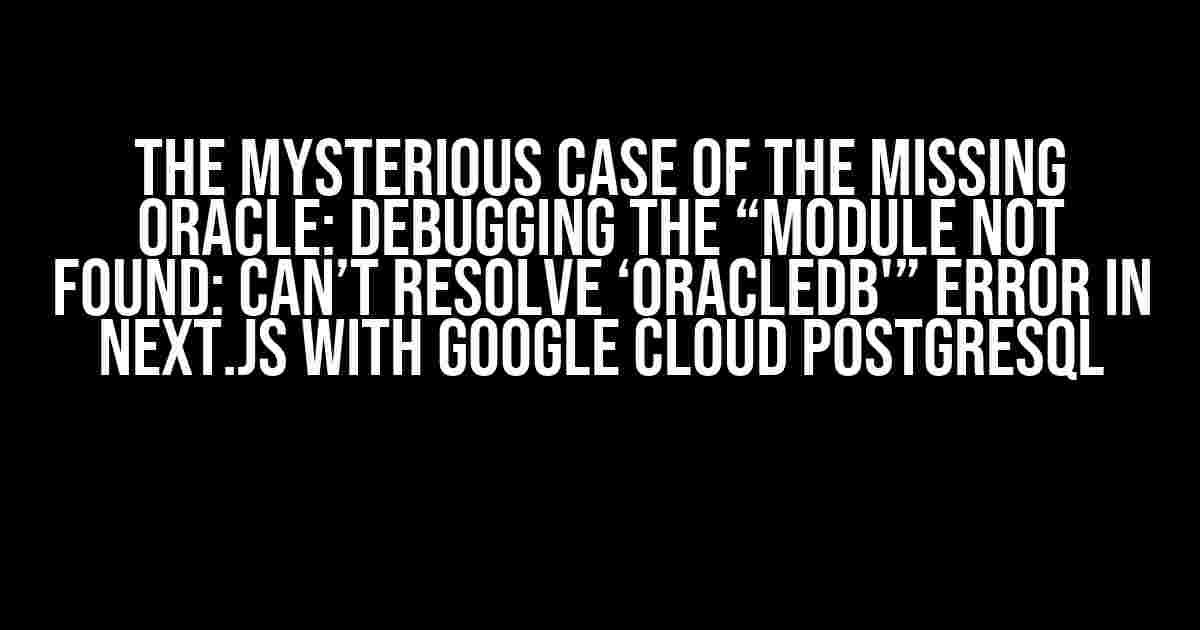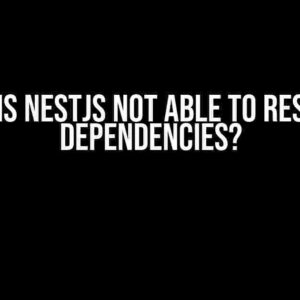Are you trying to connect your Next.js application to a Google Cloud PostgreSQL database, only to be met with the cryptic error message “Module not found: Can’t resolve ‘oracledb'”? Don’t worry, you’re not alone! In this article, we’ll delve into the mystery of the missing Oracle and guide you through the steps to resolve this frustrating issue.
The Plot Thickens: Understanding the Error Message
Before we dive into the solution, let’s take a closer look at the error message. “Module not found: Can’t resolve ‘oracledb'” suggests that Next.js is trying to import the `oracledb` module, which is used for connecting to Oracle databases. But wait, you’re not using Oracle at all! You’re trying to connect to a PostgreSQL database, which uses a different set of drivers and libraries.
The Culprit: A Misleading Dependency
The root cause of this issue lies in a misleading dependency in the `pg` module, which is used to connect to PostgreSQL databases. The `pg` module relies on the `oracledb` module as a peer dependency, which is why Next.js is trying to import it. This is a known issue in the `pg` module, and it’s been reported on the official GitHub repository.
Solving the Mystery: Step-by-Step Instructions
Now that we’ve identified the culprit, let’s walk through the steps to resolve the “Module not found: Can’t resolve ‘oracledb'” error:
-
Verify Your Dependencies
First, make sure you have the correct dependencies installed in your `package.json` file. You should have `pg` and `next` installed as dependencies. Run the following command to verify:
npm ls pg nextIf you don’t see `pg` or `next` in the list, install them using the following command:
npm install pg next -
Update the pg Module
Update the `pg` module to the latest version using the following command:
npm install pg@latest -
Install the pg-native Module
Install the `pg-native` module, which is a native implementation of the PostgreSQL driver:
npm install pg-native -
Configure Next.js to Use pg-native
Create a new file called `next.config.js` in the root of your project with the following content:
module.exports = { webpack: (config) => { config.module.rules.push({ test: /\.node$/, use: 'node-loader', }); return config; }, };This configuration tells Next.js to use the `node-loader` for loading native modules, including `pg-native`.
-
Update Your Database Connection Code
Update your database connection code to use the `pg-native` module:
const { Pool } = require('pg-native'); const pool = new Pool({ user: 'your_username', host: 'your_host', database: 'your_database', password: 'your_password', port: 5432, }); pool.query('SELECT * FROM your_table', (err, result) => { if (err) { console.error(err); return; } console.log(result.rows); });Make sure to replace the placeholders with your actual database credentials and table name.
Troubleshooting Common Issues
If you’re still encountering issues after following the steps above, here are some common issues to troubleshoot:
-
Module not found: Can’t resolve ‘pg-native’
If you’re still seeing the “Module not found: Can’t resolve ‘pg-native'” error, make sure you’ve installed `pg-native` correctly and that it’s listed in your `package.json` file.
-
Error: Cannot find module ‘node-loader’
If you’re seeing an error message about `node-loader` not being found, make sure you’ve installed `node-loader` correctly and that it’s listed in your `package.json` file.
-
Connection Timeout or Refused
If you’re experiencing connection timeouts or refused connections, make sure your database credentials are correct and that your PostgreSQL instance is running.
Conclusion: Slaying the Oracle Beast
With these steps, you should be able to connect your Next.js application to your Google Cloud PostgreSQL database without encountering the “Module not found: Can’t resolve ‘oracledb'” error. Remember to update your dependencies, install `pg-native`, and configure Next.js to use the native implementation of the PostgreSQL driver.
By following this guide, you’ll be able to slay the Oracle beast and connect your Next.js application to your PostgreSQL database with ease. Happy coding!
| Dependency | Version |
|---|---|
| pg | latest |
| pg-native | latest |
| next | latest |
| node-loader | latest |
Note: Make sure to check the latest versions of the dependencies and update them accordingly.
Frequently Asked Question
Are you facing issues with Next.js connecting to Google Cloud PostgreSQL and encountering the frustrating error “Module not found: Can’t resolve ‘oracledb'” even though you’re not using Oracle at all? Worry no more! We’ve got you covered with these frequently asked questions and answers.
Why am I getting an error related to Oracle even though I’m using PostgreSQL?
This error usually occurs when a dependency in your project is trying to import the Oracle database driver (oracledb) even though you’re not using Oracle. Check your `package.json` file and `node_modules` directory to see if there are any unnecessary dependencies or leftovers from a previous project.
How can I identify which dependency is causing the issue?
To identify the culprit, try running `npm ls oracledb` or `yarn why oracledb` in your terminal. This will show you the dependency tree and help you trace which package is bringing in the Oracle dependency. You can then remove or update that dependency to resolve the issue.
Is it possible that Next.js is causing the issue?
While Next.js itself doesn’t use Oracle, it’s possible that a plugin or middleware you’re using is causing the issue. Check your `next.config.js` file and any custom plugins you’ve installed to see if they’re importing the Oracle driver.
How do I fix the error if I’m using a third-party library that depends on oracledb?
If you’re using a library that depends on oracledb, you can try adding an alias or a custom resolver in your `next.config.js` file to override the dependency. Alternatively, you can try using a different library that doesn’t depend on Oracle.
What precautions can I take to avoid similar issues in the future?
To avoid similar issues, make sure to regularly audit your dependencies, keep your `node_modules` directory clean, and test your code thoroughly before deploying to production. You can also use tools like `npm audit` or `yarn audit` to identify and fix potential issues.





